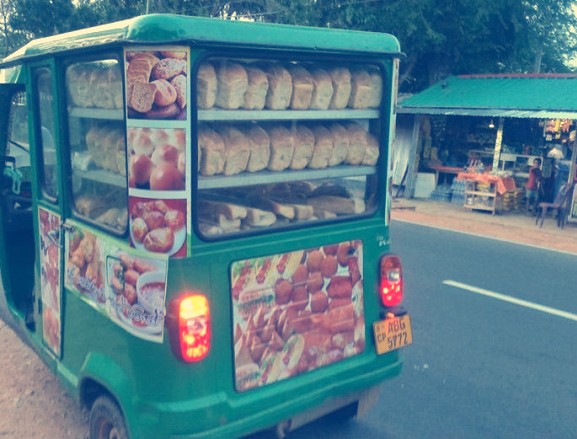“One must have bread; but before bread, one must have the ideal.”
― Victor Hugo, Les Misérables
Once upon a Monday morning, years ago, in a Sri Lankan village, Kurunegala, a little girl wakes at 6:30 to… Beethoven.
Für Elise. For a certain Elise in 1810. The most famous piece of classical music ever composed wafts through the window. Over the dusty path, it stretches, tinny and simple and pure, like from a child’s music box, with the sun, over rice fields.
Happy shriek and barefoot pitter patter out the house just in time to wave to the music-playing tuk-tuk driving by. The tune, Bagatelle No. 25 in A minor, comes from an old Nokia phone held to a speaker. The smell – the glorious smell of fluffy, buttery, home-baked, still warm – from a glass case attached to the tuk-tuk with string, dubiously.
In Sri Lanka, once upon a time, bakers delivered bread to people’s homestwice a day. In the morning, malu paan – fish buns, caramelized onion sambols, or sausage rolls for breakfast. Roast paan for dhal or curry later. In the afternoon, around four, buns sprinkled with raisins, stuffed with jam, or – the child’s favourite – plain, dusted with sugar, twisted like a crocodile: kimbula, shared with her father.
Half for her, half for him, soaked in ginger tea. She always got the bigger piece. All fathers are like that, or should be. And all childhood memories: star dusted and filled with the possibility of being whatever, whoever one wishes to be.
“The poor young man must work for his bread; he eats; when he has eaten, he has nothing left but reverie.”
Reverie, a recipe: a loaf of bread, a little music, tea.
Choon paan translates to “music bread” in Sinhala. Für Elise to something shared, something sweet, tinny maybe. Something simple. Itis not a simple melody:
The most recognized, reproduced, butchered piece of music in the world was discovered by chance, forty years after the death of the composer. It is actually a complex, sophisticated rondo that, in three parts, develops a misleadingly plain theme. A gem of progressive tension, contrasts: rises, peaks, dips, returns to cadence.
Ludvig van Beethoven used six simple notes – the most common combination in classical music – and a simple technique. The result: “absolute genius.”
The little girl and Sri Lanka outgrew choon paan trucks, as do, perhaps, other children elsewhere ice cream vans, pinwheels, soap bubbles. Carts of roasted corn and chestnuts, lemonade stands. In Beirut, kaak: ring pockets of sesame bread stuffed with sumac, mild cream cheese, or zaatar. Tirmos: golden beans gleaming in lemon juice, like coins in a treasure chest, sprinkled with salt, eaten on the corniche with toothpicks from checkered cartons.
“The poor man sees the sky, space, the stars, the flowers, the children, the humanity in which he suffers, the creation in which he shines. He looks at humanity so much that he sees the soul, he looks at creation so much that he sees God. He dreams, he feels that he is great; he dreams some more…” – Victor Hugo
The pandemic brought choon paan trucks back, and family members home. A not-so-little-girl-now and her father once again shared kimbula. Für Elise has been playing again, and old records in living rooms. Board games have resurfaced, missing pieces replaced. Old bicycles have been oiled.
Books left on curbs, loaves of bread in baskets hanging from balconies,
“And is he unhappy? No. The poverty of a young man is never miserable.”
